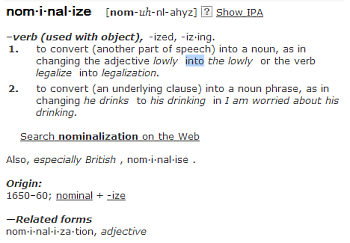
This caption is a nominalization of a nominalization of a nominalization of a...
It truly is a sad state of affairs when a word, doing perfectly fine on its own for the past few centuries, is spun by some “news event” or “social explosion” into a term that is, more often than not, unrelated to its original meaning. Some relevant examples are ‘green’, ‘change’, and ‘organic’.
There are also those words that are very important to understanding how our world works and how to more effectively work within it. A good example of this is the topic of this post:
NOMINALIZE, adj.
Definition: To convert another part of speech into a noun.
Examples: Change the adjective “lowly” into the noun “the lowly” or changing the verb “legalize” into the noun “legalization“.
Why does this matter?
Problems arise when the nominalized terms are purposefully used to (1) obfuscate true intent or to (2) clump individuals into groups. It is not my intent to focus on whether or not either of these are done purposefully, though this is a very important point.
The former (1) can be troublesome as more often than not, nominalized terms mask underlying layers of questions or qualifiers that are usually not addressed. For instance, ‘careless’ is turned into ‘carelessness’, which begs “compared to what? regarding what? what duration? what frequency?”. Without an adequate reference to the nominalization in a preceding sentence, the term only serves to mask and confuse. This does not necessarily imply nefarious intent, but it does usually result in poor communication.
The later (2) is particularly noteworthy as once an individual is overshadowed by the ‘group’ or ‘label’ affixed to him, he can be summarily dismissed. Basically, someone assigns traits to a non-existent group (i.e. – the nominalization), and anyone who exhibits any trace of a related trait can be labeled and clumped. For instance, ‘lowly’ is turned into ‘the lowly’ and again this begs to bring up a multitude of questions that will never be given adequate consideration. This form of usage is of particular note when it comes to public speaking and politics: ‘rightwingers’, ‘teabaggers’, ‘extremists’, ‘terrorists’, et cetera. None of these terms mean much of anything without a full paragraph or two to accompany them.
What do we do about this?
Stop using these terms, ask the implied questions, and do not let others fall into the same traps that poor communication brings about. Begin to see what traits people are exhibiting that lead you to want to attribute the nominalizations and leave it at the traits. Make the words you speak and use mean something again.